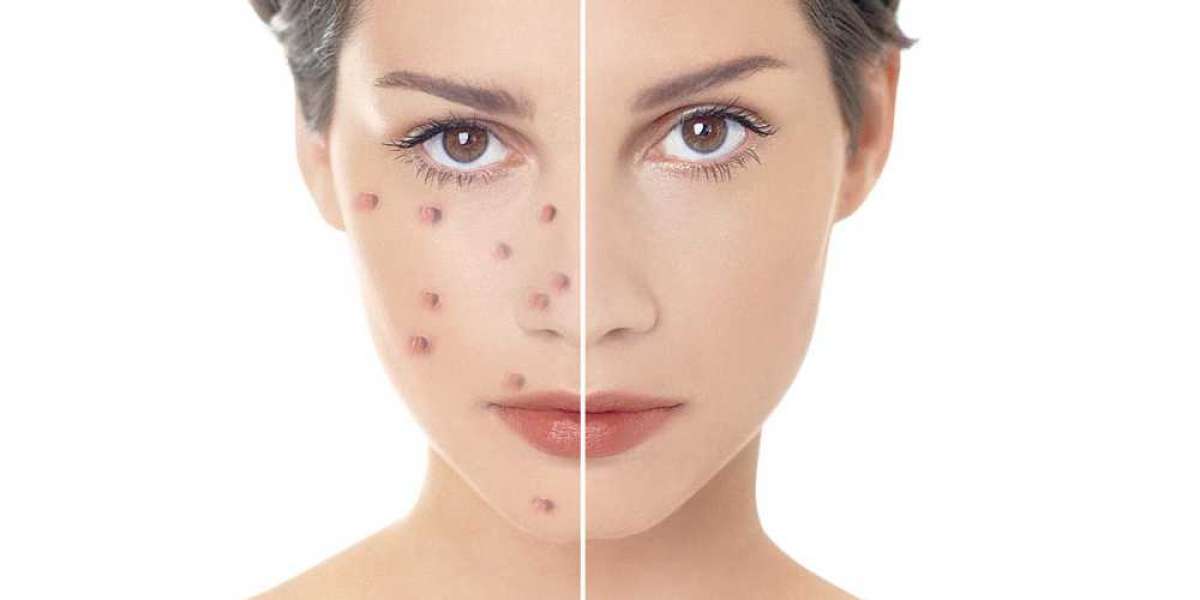Achieving clear skin starts long before applying any product or booking a skin treatment—it begins with understanding your unique skin type. In a city like Islamabad, where environmental conditions vary seasonally, tailoring skincare and treatments to your skin’s needs is essential.
Why Your Skin Type Matters in Acne Treatment
Knowing your skin type allows dermatologists to recommend targeted therapies for acne, which reduces the risk of irritation and enhances results.
Skin types include oily, dry, combination, normal, and sensitive—each reacts differently to treatments.
Misidentifying your skin type can lead to the wrong products or procedures, worsening your acne.
For example, harsh products used on sensitive skin can cause inflammation rather than clearing breakouts.
Types of Skin and Their Impact on Acne
Each skin type has distinct characteristics that influence how pimples form and how treatments work.
Oily Skin
This is the most acne-prone type due to excessive sebum production.
Oily skin tends to clog pores easily, leading to whiteheads, blackheads, and cystic acne.
Treatments like salicylic acid peels, benzoyl peroxide washes, and oil-control facials are ideal.
Dry Skin
While less prone to acne, dry skin can still develop pimples, often due to overuse of dehydrating products.
Flaky, tight skin may lead to micro-tears, making it vulnerable to infection and breakouts.
Hydrating treatments and moisturizers with hyaluronic acid are effective for acne control.
Combination Skin
A mix of oily and dry zones, commonly with a shiny T-zone and dry cheeks.
Requires a dual approach—oil control on the T-zone and hydration on drier areas.
Dermatologists may recommend targeted spot treatments to avoid over-drying.
Sensitive Skin
Highly reactive and prone to redness, inflammation, and burning sensations.
Needs gentle products free from alcohol, fragrance, and harsh exfoliants.
Treatments like LED light therapy or anti-inflammatory facials are often preferred.
Normal Skin
Balanced skin that rarely breaks out but is still not immune to pimples.
Maintenance is key—routine cleansing and gentle exfoliation work best.
Occasional treatments like hydrafacials or mild peels help prevent future acne.
Identifying Your Skin Type: What to Look For
Understanding your skin type doesn't require expensive tests—it’s about observing how your skin behaves daily.
After washing your face, if it feels tight or flaky, it’s likely dry.
If it looks shiny or greasy within hours, it's oily.
A combination of both suggests combo skin.
Redness and stinging indicate sensitivity.
If your skin feels smooth, balanced, and blemish-free, it's likely normal.
Common Causes of Pimples Based on Skin Type
Each skin type can develop pimples due to different triggers. Recognizing these helps in prevention and treatment.
Oily skin: Excess sebum, hormonal changes, and bacteria buildup.
Dry skin: Over-cleansing, lack of hydration, or using alcohol-based products.
Combination skin: Using one-size-fits-all products that don’t target both oil and dryness.
Sensitive skin: Allergic reactions, fragrance in skincare, or over-exfoliation.
Normal skin: Occasional stress, diet, or hormonal imbalance.
Tailored Treatments Available in Islamabad Clinics
Leading skin clinics in Islamabad provide customized solutions based on skin type, severity of acne, and individual needs.
For Oily Skin
Salicylic acid peels
Sebum-regulating facials
Laser therapy to shrink oil glands
For Dry or Sensitive Skin
Hydration-focused acne facials
LED light therapy (blue light for bacteria)
Non-comedogenic moisturizers
For Combination Skin
Dual-action facials
Spot treatments for the T-zone
Mild chemical exfoliation
Non-Invasive Options to Consider
For those cautious about downtime or side effects, non-invasive therapies offer safe and gradual improvements.
Chemical Peels: Help exfoliate dead skin and clear clogged pores without being too harsh.
Microneedling: Stimulates collagen and reduces scars left by acne.
Photodynamic Therapy: A light-based treatment that kills acne-causing bacteria.
Topical Retinoids: Available in medical-grade creams, effective for reducing inflammation and unclogging pores.
The Role of Diet and Lifestyle in Skin Health
Your skincare routine is only part of the solution. Internal health plays a big role in acne development.
High sugar intake can trigger insulin spikes, which lead to excess oil production.
Dairy products, especially skim milk, may exacerbate breakouts in sensitive individuals.
Stress and lack of sleep increase cortisol levels, encouraging oiliness and pimples.
Hydration is essential—drink at least 8 glasses of water a day.
At-Home Care After Professional Treatment
Following a clinic visit, maintenance at home is crucial to keep acne at bay and promote healing.
Use gentle, pH-balanced cleansers to avoid stripping natural oils.
Avoid touching or picking at pimples to prevent scarring.
Apply prescribed topical treatments consistently.
Protect your skin with non-comedogenic sunscreen daily.
When to See a Dermatologist in Islamabad
Knowing when to seek professional help can save you time, money, and stress.
If acne doesn’t respond to OTC products within 4–6 weeks
If you develop cystic or painful acne
When overuse of skincare products makes things worse
If acne is affecting your confidence or mental health
What Makes Islamabad Clinics Unique in Acne Management
Clinics in Islamabad offer globally recognized treatments combined with personalized care.
Highly qualified dermatologists with extensive experience in treating regional skin types
Advanced technologies such as fractional lasers, chemical peels, and LED therapies
Customized treatment plans based on detailed skin analysis
Affordable options with visible results and minimal downtime
Common Mistakes to Avoid in Acne Treatment
Avoiding these pitfalls can significantly enhance Pimples treatment in Islamabad effectiveness and prevent worsening of acne.
Skipping sunscreen: Sun exposure worsens inflammation and post-acne marks.
Over-washing the face: Strips the skin of its natural barrier, causing more oil production.
Using multiple new products at once: Makes it hard to identify what works and may cause reactions.
Neglecting hydration: Even oily skin needs moisture to balance oil production.
Long-Term Skincare Plan for Acne-Free Skin
Clearing acne is not a one-time event—it’s an ongoing process that includes preventive measures.
Continue follow-ups with your dermatologist every 4–6 weeks.
Adjust skincare with seasonal changes.
Incorporate exfoliation and antioxidant-rich products.
Use non-comedogenic makeup and cleanse thoroughly after wear.
Conclusion: The First Step to Clear Skin Is Knowing Your Skin
Before jumping into treatment plans, understanding your skin type is key to achieving clear and lasting results. With proper guidance and expert care, acne can be effectively managed and even prevented.
Whether you have oily, dry, sensitive, or combination skin, personalized attention ensures you’re not just treating symptoms but addressing the root cause.
For those looking to begin or enhance their skincare journey, Enfield Royal Cosmetic in Islamabad provides expert consultation, tailored treatment plans, and advanced acne solutions. Their experienced dermatologists take time to understand your skin type and customize your acne care plan accordingly. Clear skin is not a dream—it’s just one expert consultation away.






